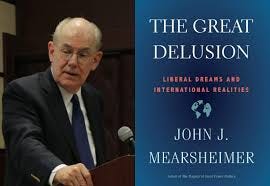Notes
THE GREAT DELUSION, by John J. Mearsheimer (2018, Yale, 313 pages)
This very hopeful book about politics and policy examines the liberal agenda of U.S. administrations during the lifetimes of most of us now (say from WWII and the beginning of the Cold War to the present). The book takes the levels, or modes of analysis from overall ideology and theory and delves into these in considerable detail and with a critical thought or two on every page. The subject of analysis is what many know as great - power politics, and what the author knows as, separately, the politics of peace, interdependency and institutions as these relate to U.S. foreign policy over the last half - century and more. These three agenda items are examined from the ideological standpoint and as theory, and in different case studies, permutations by the author, essentially, in this three hundred and more page illustration of foreign policy efforts by “liberal” democracies and involving liberal democracy in one form or another as promulgated by the American political system and its policymakers.
As there is now a popular belief that in authoritarian regimes, foreign policy in the face of democracy or democracies is much conditioned and derivative of politics and attitudes internal to the country or region : The author wrote this text in 2018, before the commonweal had seized upon external policies reflecting internal politics in such regimes, though the author portrays U.S. political activism and institutional and state - building not as an international pledge as it might be, but as a promise at home that relates to national security, national inegrity and the integrity of liberal democracy as is found in the U.S. That foreign policy as established in the capitol in Washington, D.C., does not strictly reflect popular or powerful internal party attitudes but the promise of constitutional and political rights of free people and their institutions stands out markedly in this text, and despite the flaws of the democratic system we have if there are any under the circumstances.
The book is critical of the pitfalls and traps of democratic nations, led by America, that carry them inevitably into conflict and seemingly in an endless series of these — since the end of WWII, and this is spelled out in the book, the U.S. has been at war in more years than not in following its strategic imperatives against communism, against authoritarian rule, against militarism, against territorial aggression and against terrorism; and the list goes on. The strategy of containment of the U.S.S.R. during the cold war is considered ineluctable but largely a failure, though no standard of failure is discussed in depth to illustrate the deficiencies of containment, a strategy pursued by U.S. administrations for decades during the Cold War. Other hot wars are examined in considerable detail, especially the costly ones in what concerns lives lost and public financies. Viet Nam and Southeast Asia and the wars fought there are exemplary in, again, the political pitfalls and traps, abject failures they presented to U.S. leadership. Some critical analysis of the wars in the former Yugoslavia, Middle East, and so on denote at the author’s levels of analysis too costly in the efforts of the U.S. to bring peace. Some narrative currency is spent in the text on the subject of the futility and overall destruction and catastrophic loss that modern warfare presents, yet free nations are engaged in the business of war on a routine basis and the idea is presented that the pursuit of democratic institutions, indeed in the nature of modern democracy, there is a thread of belligerence that is unwarranted and that calls for the resolution of conflict not by arms, and this in haste in many cases, but in giving war a backseat to state - level communications that would avoid it. There are more provocative and critically thought - out ideas and concepts that are discussed throughout the book which makes its politically quite dire illustrations of policy blunders, and then ensuing conflict, good material for the brand of political science and political analysis presented. All worth the read.

Dive into your interests
We'll recommend top publications based on the topics you select.
